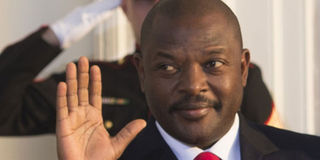Ghosts of instability haunt Burundi ahead of presidential poll

Burundi President Pierre Nkurunziza arrives at the White House for a group dinner during the US Africa Leaders Summit August 5, 2014 in Washington, DC. PHOTO | BRENDAN SMIALOWSKI |
What you need to know:
- During the latter, three activists of the ruling CNDD-FDD were shot dead by gunmen in a bar in eastern Burundi.
- Paradoxically, the ensuing national constitution that was crafted after long-drawn peace negotiations is open to interpretation.
Considering its lengthy history of devastating ethnic conflicts and monumental mayhem that took decades to curtail, recent reports of mounting violence and instability in Burundi are by all accounts alarming.
That is particularly so given that Burundi is still recovering from a brutal 13-year civil war from which it emerged in 2006, and the country’s political climate remains fractious.
Specifically, there have been claims by bodies such as Amnesty International that the ruling party, the National Council for the Defence of Democracy-Forces for the Defence of Democracy (CNDD-FDD), has been waging a “relentless campaign of intimidation” against its critics.
As for the devastating civil war that wreaked havoc in the country, it ended with the election in 2005 of current President Pierre Nkurunziza, himself a former rebel leader.
Alarmingly, the recent upsurge of violence in the country comes just months prior to two major elections slated for the middle of this year, among them the presidential poll supposed to be held on June 26.
Pointedly, past violence in the tiny Central African country approached genocidal proportions, and delicate negotiations had to be held over the years before a semblance of stability was achieved.
That achievement notwithstanding, the recent resurgence of violence is worrying. Barely two weeks ago, for instance, there were reports of heavy clashes in north-western Burundi.
The fighting was between the army and rebels who had allegedly crossed over from the neighbouring Democratic Republic of Congo, and an army spokesman reportedly said over 100 fighters from an initially unidentified rebel group had been killed.
Following the fighting, which took place in Cibitoke Province, 50 kilometres north of the capital Bujumbura, an army spokesman reportedly said that documents found in the conflict location showed that the rebels had plotted “attacks throughout the country before elections” due in May and June, and had allegedly planned a major offensive to destabilise the country ahead of the polls.
Predictably, there were repercussions following the army action, and not long afterwards the national police reported the carrying out of apparent revenge attacks.
During the latter, three activists of the ruling CNDD-FDD were shot dead by gunmen in a bar in eastern Burundi.
The killings were reportedly carried out by five men dressed in army fatigues, who tied up their victims before killing them on the night of Sunday, January 4. The attackers then went to the CNDD-FDD office in Gisuru, near the border with Tanzania, and burned the party’s flag.
Remarkably, soon after the episode, party spokesman Onesime Nduwimana blamed “the extremist fringe of the opposition”, who he also accused of trying to destabilise the country by “sowing hatred” and provoking revenge attacks.
Amid the recent violence in Burundi, UN troops in the Democratic Republic of Congo have reportedly been taking up positions to support a planned offensive against Hutu rebels in the east after they ignored a deadline to surrender.
The rebels from the Democratic Forces for the Liberation of Rwanda (FDLR) had been given until January 2, 2015 to give themselves up or face concerted military action by the UN and the Congolese armed forces (FARDC).
In the meantime, the UN mission had reportedly pre-positioned its troops and enablers “to support offensive operations against the FDLR in keeping with its mandate.”
Accordingly, UN mission chief Martin Kobler briefed the UN Security Council last Monday on the plan for the 20,000-strong Monusco force to support Congolese government troops in their military campaign against the recalcitrant FDLR.
“This operation is a warning to FDLR that FARDC and UN forces are determined to hit hard,” Colonel Patrick Opia, operations commander for the Congolese forces, reportedly said.
Back to Burundi, if everything goes according to plan, the crucial presidential election on June 6 will be preceded a month earlier, on May 26, by the country’s legislative elections.
President Nkurunziza is expected to run for a third term in office despite opponents’ claims that such a move would violate Burundi’s Constitution.
Interestingly, though, Mr Nkurunziza has been holding his cards close to his heart and has not confirmed whether he will seek another term. Still, the prospect of the incumbent seeking to run for a third term has already become the subject of mounting controversy between the ruling party and its opponents.
Poignantly, the epic Arusha Peace and Reconciliation Agreement for Burundi signed on August 28, 2000 stipulated that there would be a two-term limit for the presidency.
Paradoxically, the ensuing national constitution that was crafted after long-drawn peace negotiations is open to interpretation.




